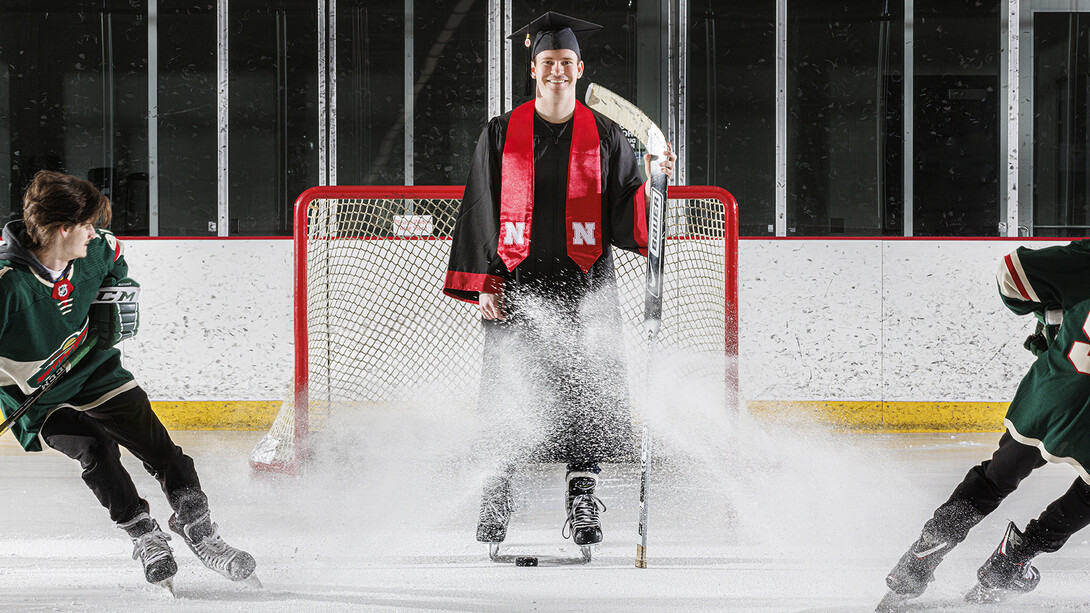
Alex Cathcart’s 15-year pursuit of a professional hockey career ended with a home skate in California.
“I was 20 years old and I got another concussion — my fifth,” Cathcart said. “It ended up being really pretty bad, with like 18 months of constant migraines and lots of light sensitivity.
“I knew I was going to be OK eventually, but it was time to make a decision — either I could keep playing, risking further injury with no guarantees that I would recover, or it was time to quit playing and go to college.”
Passions discovered
Cathcart was introduced to the game of hockey at the age of 5 as part of a friend’s birthday party. He vaguely recalls enjoying skating with friends, but he was enthralled watching a men’s league play as he sat at a window eating a slice of cake.
“I turned to my dad, pointed at the game and told him that I wanted to do that,” Cathcart said. “About three months later, I started playing.”
He hoped to play goalie — a youthful imagination drawn to the “cool” pads, protective gear and unique stick. But, Cathcart’s parents (believing the game would be a phase and not wanting to invest in the more expensive equipment) told their son that the league required two full seasons of play before one could be a goalie.
Two years later, Cathcart stepped into the net. His goalie skills advanced and he would play for the Los Angeles Selects team. By the age of 16, he moved to Omaha to stay with a host family and play AAA hockey — the highest level of the games minor leagues and home to the nation’s best players between the ages of 9 and 18.
He also played in the North American Hockey League and North American 3 Hockey League with the Amarillo Bulls and Willmar WarHawks, respectively.
During his time with the game, Cathcart discovered a secondary passion for mathematics — a subject he disliked in high school.
“When I started playing in the junior leagues, they started showing me analytics of the game, breaking down our playing style and habits into numbers,” Cathcart said. “Ultimately, their work helped us be more confident and make better decisions while in games.”
Choosing Nebraska U
While recovering from the concussion, Cathcart factored in the pluses and minuses of his options — ultimately deciding it was time to hang up his skates. He applied to universities and landed at the University of Nebraska–Lincoln, earning a Regents Scholarship, joining the University Honors Program, and selecting mathematics as a major (with a focus on finance).
“My hockey experience allowed me to see that math can be used to tell a story,” Cathcart said. “I found that fascinating and wanted to learn all I could about it. It was challenging and it probably made me lose more hair than another major would have, but I loved every second of it.”
During his freshman year, Cathcart also worked for the Lincoln Stars as director of hockey operations. The job included breaking down play real-time to help coaches make decisions as individual games progressed.
The work led Cathcart to connect certain areas of play with positive outcomes. Using his developing math skills, Cathcart continued to refine the concept and developed a statistic-based formula aimed at predicting the outcome of hockey games. The work was featured in his Honors Program senior project.
“The project challenged me intellectually and was fulfilling as the formula showed a 90% success rate in predicting game winners,” Cathcart said. “It was an incredible opportunity to combine my passions for hockey and math and it gave me the confidence to use what I learned here at Nebraska in creative ways to make original discoveries.”
Cathcart hopes to continue to refine the formula after graduation.
Campus connections
During his time on campus, Cathcart served three years as an intern for Chancellor Ronnie Green; was a student representative on the university’s COVID-19 Task Force; was active in the Honors Program; joined Sigma Chi, including serving a year as the fraternity’s recruitment chair; and, inspired by social distancing during COVID-19, helped launched “The Human Connection” project.
“My involvement is what made my college experience so incredible,” Cathcart said. “I’m a big believer in putting yourself out there — especially in situations where you might not feel entirely comfortable — to gain life experience.
“My recommendation to every current and future Husker is to be as involved as possible. Pursue your passion while you are here and don’t be afraid to go up to someone and just start a conversation. Be nice. And always treat every day as an opportunity.”
After graduation, Cathcart will move to Los Angeles to join Deloitte as a technical consultant.







